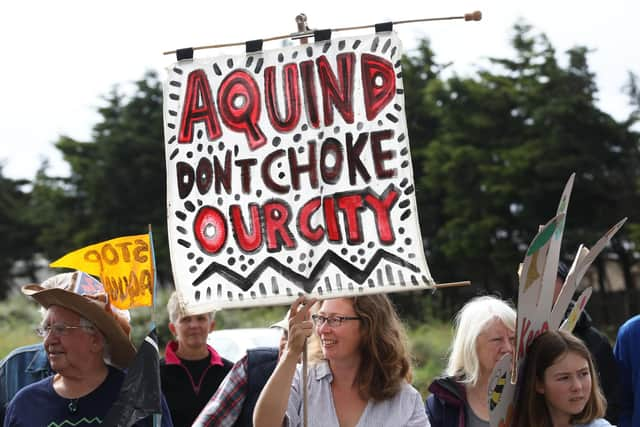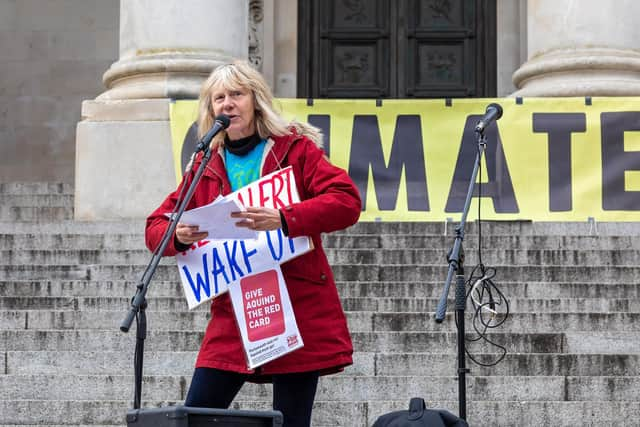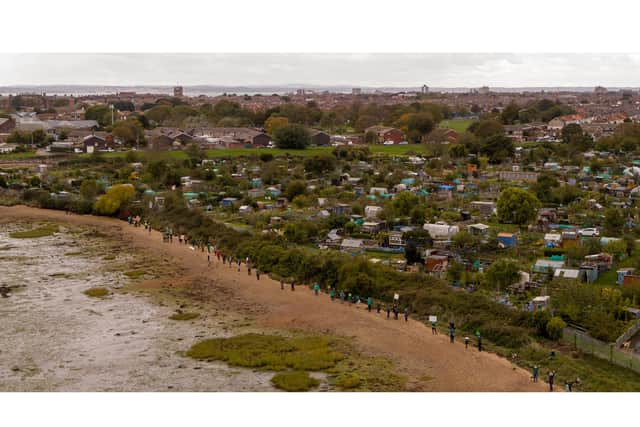Aquind interconnector refusal sparks joy across Portsmouth and surrounding areas
and live on Freeview channel 276
The cross-Channel scheme proposed by Aquind has been rejected by the government’s business secretary Kwasi Kwarteng.
Over the past four-and-a-half years it has sparked widespread community opposition as it would have seen large stretches of Portsmouth dug up.


Advertisement
Hide AdAdvertisement
Hide AdThe cables would have been landed at Eastney, and then routed up the eastern side of Portsea Island – leading to disruption to the Eastern Road for years – finally going into an interconnector that would have been at Lovedean on the edge of the South Downs National Park.
Alexander Temerko, a British citizen who was born in the former Soviet Union, has donated more than £1m to the Tories and is listed as a director of Aquind Limited.
A letter published on the Planning Inspectorate website showed Mr Kwarteng decided to ‘refuse development consent’ having considered his obligations under the energy National Policy Statement.
Mr Kwarteng was said not to be satisfied that ‘appropriate alternatives to the proposed route’ had been sufficiently considered.


Advertisement
Hide AdAdvertisement
Hide AdPortsmouth politicians from all parties opposed the plan, as did The News – which lodged a formal objection to the government's decision-making process – as well as the vocal and organised Let’s Stop Aquind group which demonstrated and campaigned against the scheme.
Penny Mordaunt, Portsmouth North MP, said: ‘We did it. When we work together we can achieve anything, despite the odds against us.
‘The Secretary of State’s judgement shows that the need for this scheme is outweighed by the harm it would do.
‘Well done Portsmouth and all who helped us in this. Very proud of you all.’


Advertisement
Hide AdAdvertisement
Hide AdStephen Morgan, Portsmouth South MP, added: ‘The government have finally seen sense and stopped the disastrous Aquind project.
‘This is a victory for the people of Portsmouth over years of uncertainty and Tory cronyism.
‘I pay tribute to local campaigners who have helped me lead our city’s united opposition.
‘Without our efforts, this would not have been possible. Together, we have stopped Aquind.’


Advertisement
Hide AdAdvertisement
Hide AdPortsmouth City Council leader Gerald Vernon-Jackson said: ‘Britain hasn't built enough generating capacity which means, at times, we don't produce enough electricity and are having to import.
‘So there's definitely logic in looking at ways of supplying the grid when other countries are producing an excess.
‘The issue is the route. It just makes no sense routing all this through the second most densely populated city in the country. It's stupid.
‘There's been political unanimity on this and that campaigning has proven really effective.’
Advertisement
Hide AdAdvertisement
Hide AdThe Portsmouth Liberal Democrat group also issued a statement saying: ‘We are delighted with the news that the Aquind Interconnector application has finally been rejected by the Minister.
‘Portsmouth Liberal Democrats opposed the Aquind plans from the very beginning and started the campaign to stop Aquind when our city councillors pushed for Portsmouth City Council to actively oppose this project.


‘Our concerns were based on environmental issues, including the traffic chaos that would have lasted for years in the city, as well as national security grounds.
‘It was great to see a community campaign galvanise the strength of local feeling and also that the city MPs joined in in opposing this project. It’s a real example of the people of Portsmouth coming together to benefit the city and cross-party working.’
Advertisement
Hide AdAdvertisement
Hide AdThe cables would have run through part of Havant borough, and its council was also opposed to the plan. Council leader Alex Rennie said: ‘I’m delighted to see that the government have acknowledged the concerns raised by local authorities such as Havant Borough Council, industry and residents alike.
‘We respect the need for investment in energy infrastructure but it doesn't come at any cost.
‘We thank the government for understanding the value we place in our unique coastline and recognising the pronounced negative effect development would've had on local residents and businesses in the borough.
‘The government has listened to our concerns we raised as a council about the route and clearly, residents will be pleased that the government has listened.’
Advertisement
Hide AdAdvertisement
Hide AdCounty councillor Patricia Stallard said: ‘In addition to being the county councillor, I've lived in the village of Denmead for over 40 years. I've seen the village grow quite considerably during that time.
‘Clearly, as we get more and more people we're going to need more energy supplies, especially with the increasing number of people accessing online facilities.
‘The principle of Aquind is something which is welcomed, but I am concerned about two things.
‘I'm concerned about the planned route - if it is granted it will have considerable upheaval for many years across our highway system. The highway roadworks which will have to take place will be very deep and extensive, and this isn't even to mention the inconvenience to business and commerce.
Advertisement
Hide AdAdvertisement
Hide Ad‘The other thing that concerns me is that I would hesitate to be wholeheartedly in the hands of another nation who might choose to cut off our supply for whatever reason, if there were ever some acrimonious discourse between the countries.
‘I feel very uneasy about being at the mercy of another country - but I do accept that we are a country that is relying more and more on our electrical devices - we can't bury our heads in the sand.’
Chairman of Horndean Parish Council, Cllr Lyn Evans said: ‘I was quite surprised by it, I thought it would be given permission. Lots and lots of people are very happy.
‘It would have caused huge disruption that everyone was concerned about including the parish council. We would have suffered from the route of the construction traffic - it will be a great relief to a lot of people.’
Advertisement
Hide AdAdvertisement
Hide AdThe scheme caused controversy in Westminster. Berwick-upon-Tweed MP Anne-Marie Trevelyan, now the International Trade Secretary, removed herself from the process in July over funding received by Northumberland Conservatives.
In 2020, Mr Temerko told MPs that Russian-linked businessmen had ‘zero’ political influence.
His remarks came amid concerns about the influence of Russian-linked oligarchs in the highest echelons of British business and politics.
Britain already has several cables which connect it to its European neighbours, allowing it to buy and sell electricity from and to the continent. These include IFA2, which lands at Daedalus on Lee-on-the-Solent.
Advertisement
Hide AdAdvertisement
Hide AdTwo of the cables already run to France and largely import French nuclear power when Britain needs it.
There are another four cables, one to the Netherlands, one to Belgium, one to Northern Ireland and one to the Republic of Ireland.
Between them they have a capacity of six gigawatts, enough to power around six million homes.
On Wednesday they supplied 6.2 per cent of the UK’s electricity needs, according to figures from National Grid.
Cables to Norway and Denmark are also being developed.
WHAT AQUIND SAID
Advertisement
Hide AdAdvertisement
Hide AdThe company said it was ‘disappointed’ with the decision and that it was considering a potential legal challenge.
A spokesperson for Aquind said: ‘We are naturally disappointed that our application has been refused, despite the existing government policy promoting development of new interconnectors and the benefits the project would bring, which are acknowledged in the decision of the Secretary of State. We draw attention to the recommendation by the apolitical, independent Examining Authority that found strongly in favour of Aquind Interconnector.
‘We disagree with the decision of the Secretary of State, and the rationale behind it. We are considering the decision, the grounds for the refusal, and a potential legal challenge (Judicial Review). We believe our application for a Development Consent Order to be accurate and robust, and it has met all the requirements. We will continue the development of Aquind Interconnector, and we will be engaging with the relevant parties in the coming weeks.
‘With the ability to transmit up to five per cent of Great Britain’s annual electricity consumption – enough to power nearly 5m British homes – Aquind Interconnector will help reduce the impact of volatile gas and coal prices, which have caused electricity bills to increase this autumn and winter. By reducing the price of energy in the UK, Aquind Interconnector will save individuals and families several billion pounds over the first 25 years of its operation.
Advertisement
Hide AdAdvertisement
Hide Ad‘The interconnector will help integrate a greater proportion of non-fossil fuel energy sources and intermittent renewables into the GB energy mix, helping meet the UK’s 2050 Net Zero target by reducing CO2 emissions by 40-70 million tonnes over 25 years.’
